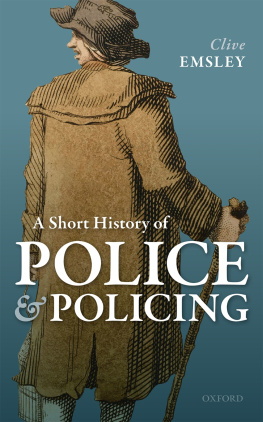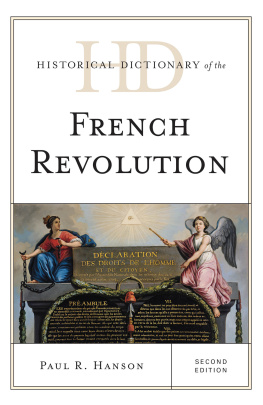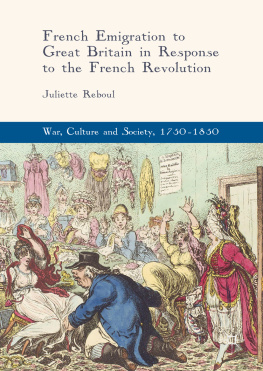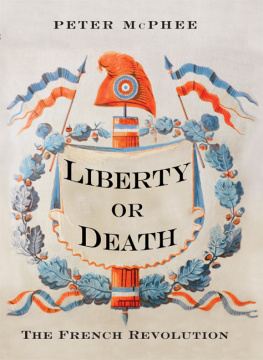Britain and the French Revolution
Seminar Studies in History
Britain and the French Revolution
Clive Emsley
First published 2000 by Pearson Education Limited
Published 2014 by Routledge
2 Park Square, Milton Park, Abingdon, Oxon OX14 4RN
711 Third Avenue, New York, NY 10017, USA
Routledge is an imprint of the Taylor & Francis Group, an informa business
Copyright 2000, Taylor & Francis.
The right of Clive Emsley to be identified as author of this work has been asserted by him in accordance with the Copyright, Designs and Patents Act 1988.
All rights reserved. No part of this book may be reprinted or reproduced or utilised in any form or by any electronic, mechanical, or other means, now known or hereafter invented, including photocopying and recording, or in any information storage or retrieval system, without permission in writing from the publishers.
Notices
Knowledge and best practice in this field are constantly changing. As new research and experience broaden our understanding, changes in research methods, professional practices, or medical treatment may become necessary.
Practitioners and researchers must always rely on their own experience and knowledge in evaluating and using any information, methods, compounds, or experiments described herein. In using such information or methods they should be mindful of their own safety and the safety of others, including parties for whom they have a professional responsibility.
To the fullest extent of the law, neither the Publisher nor the authors, contributors, or editors, assume any liability for any injury and/or damage to persons or property as a matter of products liability, negligence or otherwise, or from any use or operation of any methods, products, instructions, or ideas contained in the material herein.
ISBN 13:978-0-582-36961-0 (pbk)
British Library Cataloguing-in-Publication Data
A catalogue record for this book is available from the British Library
Library of Congress Cataloging-in-Publication Data
Emsley, Clive
Britain and the French Revolution/Clive Emsley
p. cm. -- (Seminar studies in history)
Includes bibliographical references (p. ) and index
ISBN 0-582-36961-4
1. Great Britain--Politics and government--1789-1820. 2. France--History--Revolution
1789-1799--Foreign public opinion, British. 3. France--History--Revolution,
1789-1799--Influence. 4. Great Britain--Civilization--French influences. 5. Great
Britain--Foreign relations--1789-1820. 6. Great Britain-- Foreign relations--France.
7. France--Foreign relations--Great Britain. 8. Public opinion--Great Britain--History
9. France--Foreign relations--1789-1815. I. Title. II. Series.
DA520.E47 2000
941.07'3--dc21 00-026029
Set by 7 in 10/12 Sabon Roman
Such is the pace of historical enquiry in the modem world that there is an ever-widening gap between the specialist article or monograph, incorporating the results of current research, and: general surveys, which inevitably become out of date. Seminar Studies in History are designed to bridge this gap. The series was founded by Patrick Richardson in 1966 and his aim was to cover major themes in British, European and World history. Between 1980 and 1996 Roger Lockyer continued his work, before handing the editor hip oves t< Clive Emsley and Gordon Mattel. Clive Emsley is Professor of History at the Open University, while Gordon Martel is Professor of International History at the University of Northern British Columbia, Canada and Senior Research Fellow at De Montfort University.
All the books are written by experts n their field who are not onnl familiar with the latest reseatch but have often co itributed to it. They are frequently revised, in order to take account of new information and interpretations, They provide a selection of documents to illustrate major themes and provoke discussion, and also a guide to further reading. The aim. of Se minar Studies is to clarify complex issues without over-simplifying them, and to stimulate readers into deepening thei knowledge and md rstandinj of Major themes and topics.
Readers should note that numbers in square brackets [ ] refer them to the corresponding entry in the Bibliography at the end of the book (specific page numbers are given in italics). A number in square brackets preceded by Doc. [Doc. 5] refers readers to the corresponding item in the Documents section which follows the main text.
The publishers are grateful to the following for permission to use copyright material:
The British Library for permission to use The Zenith of French Glory and Presages of the Millenium, caricatures by James Gillray.
Chapter One
Issues and Historiography
Historians argue over the causes, the course, and the consequences of the French Revolution. They differ about the dates of its beginning and its end. Yet few, if any, would deny that it had profound effects far beyond the frontiers of France. Some of the effects are relatively easy to pinpoint and provoke little debate; but there can also be significant differences of opinion, especially when historians move away from a detailed chronology of events to assessing the broader patterns and meanings of those events. Thus, while a chronicle of the impact of the French Revolution on Britain is relatively straightforward, what that impact meant in the broader picture of political and social change, of social development and class relations, of national self-consciousness remains a matter of dispute.
The period from 1688 to 1815 was one of intense rivalry between Britain and France, sometimes described as the 'second hundred years war'. The two states clashed in the four corners of the world over markets and imperial possessions. Since the reign of Louis XIV, France, a dominant continental power, had appeared to successive British governments to be aiming at European hegemony; and this was something which they could never countenance. Britain's wars against the French Revolution and, subsequently, against Napoleon, provided the climax to this facet of the rivalry and they settled the matter in Britain's favour.
But it was not only in matters of French hegemony in Europe, of markets and imperial possessions that the two countries were rivals. Eighteenth-century France was Catholic. She was ruled by a monarchy which aspired to absolutism, and this aspiration provided the model for most other princes of continental Europe. The British were fiercely Protestant and proud of the liberties and the balanced constitution which they considered they had won by the Glorious Revolution of 1688-89. They believed that these liberties and their constitution were examples for their less fortunate continental neighbours. Indeed, some eighteenth-century French thinkers pointed to what they understood to be Britain's 'balanced constitution' of the king in parliament with the counterweights of lords and commons, to the separation of executive, legislative and judicial powers, and they suggested that such structures might benefit their own country. At the same time there were Britons who, particularly from the 1780s, looked to changing French models which, they believed, might be taken up and usefully developed for their own national context []. Again, the revolutionary and Napoleonic wars appeared to settle the matter in favour of constitutional monarchies and parliamentary structures, though the extent to which Britain can be considered as a model remains a moot point.











